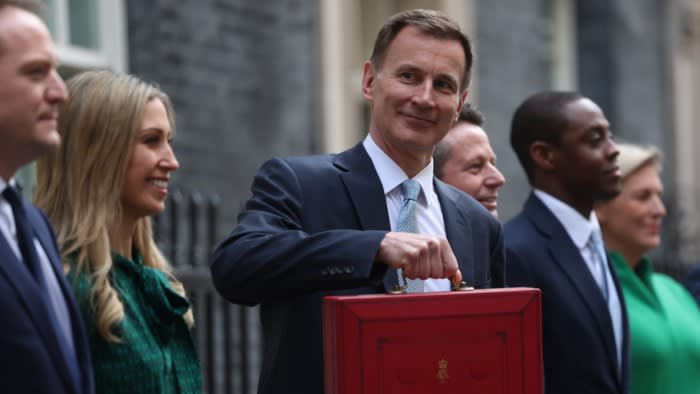
Unlock the Editor’s Digest for free
Roula Khalaf, Editor of the FT, selects her favourite stories in this weekly newsletter.
Fiscal rules are an important safeguard. With voters to chase, governments have an incentive to overspend, and lumber future taxpayers with the costs. Bond traders can also punish profligate spending plans by pushing up government bond yields. Kwasi Kwarteng, who delivered the UK’s unrestrained “mini-Budget” in 2022, found out the hard way when his £45bn package of tax cuts — funded by borrowing and the promise of future growth — blew up Britain’s bond, currency and pension markets.
But rules do not guarantee prudent policymaking. Poorly devised rules can even encourage bad choices. Britain’s chancellor Jeremy Hunt demonstrated this last week at the spring Budget. He met his goal to have debt falling as a percentage of gross domestic product within five years, according to the Office for Budget Responsibility. But to get there he relied on unspecified cuts to government departments, a reduction in growth-enhancing public investment, and revenue from future fuel duty rises, which have been perpetually cancelled. He also left little margin for error against highly fickle forecasts.
There are two core flaws with Hunt’s debt rule. First, it does not encourage long-term thinking. It takes more than five years for most productivity-enhancing reforms or capital investment to boost growth, and improve the debt ratio. This means disproportionate weight is given to the near-term cost of such initiatives. Second, the five-year window is rolling, which means the chancellor can meet it by pencilling in backloaded spending cuts or tax rises that never happen.
Britain’s fiscal rules need to be better designed. Beside ensuring sustainable public finances, they should support long-term growth — by distinguishing between day-to-day spending and investment. They need to be hard to game, and they ought to be long-lasting. Regular fiddling undermines their credibility. Since 1985, the average lifespan of a UK fiscal rule has been below four years — the shortest across the OECD, according to the Institute for Government.
The rules might be improved in several ways. For instance, a promise to balance the current budget — the difference between day-to-day revenues and spending — could help to discourage borrowing or capital spending cuts to meet short-term needs. It would also allow borrowing for investment. But no government should have a blank cheque for capital spending either. A complementary constraint on the debt ratio or debt servicing costs would be necessary. Reducing the five-year timeframe might also help to ensure fiscal plans are more realistic.
But whatever the rules are, there will always be an incentive for governments to game them or run them too close for comfort. There are no all-weather rules, and setting specific targets is an inherently arbitrary task. Rules need to be sufficiently flexible to respond to economic circumstances. This means the process of setting fiscal policy can matter more than the specific rule itself.
Governments should unveil more detailed future spending plans — including how and where any cuts may fall. Britain’s two annual fiscal events and spending reviews open the door to repeated tinkering. The role of the fiscal watchdog in holding the government to account should also be strengthened. A better resourced OBR could more accurately assess the viability of government spending plans and the impact of its policies on long-term growth.
In time, a shift away from point targets to a more holistic debt sustainability analysis by the OBR, which assesses government plans across a range of metrics, would be desirable. It would help balance the dual goals of sound public finances and long-term growth better.
With public spending demands rising and a grim outlook for growth, tweaking Britain’s spending rules again will not be enough. Instead, the next government should begin a fundamental rethink of how the country runs its fiscal processes altogether.
Read More: World News | Entertainment News | Celeb News
FT










